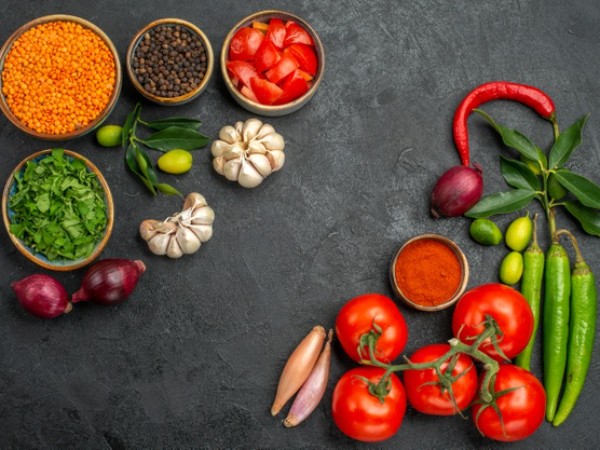Just In
- 2 hrs ago

- 6 hrs ago

- 10 hrs ago

- 10 hrs ago

Don't Miss
- Technology
 itel Super Guru 4G Phone With UPI Support Launched in India; Check Price, Specifications
itel Super Guru 4G Phone With UPI Support Launched in India; Check Price, Specifications - News
 More Than Rs 1000 Crore Spent By DMK, AIADMK To Win Election In Coimbatore: Annamalai
More Than Rs 1000 Crore Spent By DMK, AIADMK To Win Election In Coimbatore: Annamalai - Sports
 Why camera zoomed in on IPL 2024 coin toss after Sam Curran flipped it in front of Hardik Pandya in Mullanpur?
Why camera zoomed in on IPL 2024 coin toss after Sam Curran flipped it in front of Hardik Pandya in Mullanpur? - Finance
 1:2 Bonus, Rs 401/Sh Dividend; Tata's NBFC Stock Falls On Big Update Related To Dividend Recommendations
1:2 Bonus, Rs 401/Sh Dividend; Tata's NBFC Stock Falls On Big Update Related To Dividend Recommendations - Movies
 Pranali Rathod New Show: Yeh Rishta Kya Kehlata Hai Star Signs Next Project Of Jhanak Makers? DEETS
Pranali Rathod New Show: Yeh Rishta Kya Kehlata Hai Star Signs Next Project Of Jhanak Makers? DEETS - Automobiles
 India's Elections Trigger Airfare Surge in Tamil Nadu
India's Elections Trigger Airfare Surge in Tamil Nadu - Education
 Karnataka SSLC Result 2024 Soon, Know How to Check Through Website, SMS and Digilocker
Karnataka SSLC Result 2024 Soon, Know How to Check Through Website, SMS and Digilocker - Travel
Telangana's Waterfall: A Serene Escape Into Nature's Marvels
What Happens To Your Body When You're Not Eating Enough Vegetables?
Growing up, we've had our vain battles with vegetables, bawling, pretending to be not hungry, and even nicely transferring it to your siblings' plate when your parents are not watching.
It is no unknown fact that all vegetables contain healthful vitamins, minerals, and dietary fibre, and some stand out for their exceptional benefits. A diet high in vegetables can help protect you against cancer, diabetes and heart disease [1].
The dietary fibre from vegetables can help to reduce blood cholesterol levels and increase folic acid in the blood. The Dietary Guidelines of USDA claim that you should consume between 5 and 13 servings of fruits and vegetables per day. This is equivalent to about 2 ½ to 6 ½ cups daily, depending on the number of calories you need to eat to maintain your weight.
In this article, we will look at the signs which indicate that you're not eating enough vegetables.


1. You Get Bruised Easily
Consuming fewer amounts of vitamin C can cause bruising easily, bleeding gums, weakness, fatigue, rash and decrease the rate of healing of wounds and cuts. Eat vitamin C-rich foods like red peppers, red chilli peppers, kale, dark green leafy vegetables, broccoli, Brussels sprouts and tomatoes [2].
2. You Get Constant Bouts Of Cold
A lack of vegetables in your diet and the essential nutrients (vitamin C) they provide will make your body deficient in the defences it needs to release free radical fighters against virus and bacteria. Consume dark green leafy vegetables that will help strengthen your immune system and provide you with antioxidants and iron in abundance [3].
3. You Are Tired Most Of The Time
If you feel tired all the time, then it can be a deficiency of folate or folic acid. Folate deficiency leads to fatigue and anaemia. It also plays a role in DNA synthesis and repair. Folate or folic acid is a B9 vitamin that can be found in dark green leafy vegetables like kidney beans, asparagus, lentils, spinach, etc.; hence, including it in your diet is a must [4].
4. Your Memory Is Foggy
While occasional forgetfulness occurs at all ages, if you find your brain cannot memorize a small thing, then it is a sign you are not getting enough nutrients. Lutein, a nutrient, has been shown to enhance memory and learning. It is found in carrots, leafy greens, broccoli, corn and tomatoes. This nutrient can also help protect against cataracts and macular degeneration - the two common eye disorders [5].
5. You Find It Hard To Handle Daily Stress
Eating certain foods affects your stress levels significantly. Inflammation is your body's natural response to stress, and if you are not handling stress well, inflammation could have damaging effects on your body. Eat anti-inflammatory foods like salmon, tuna, bright-coloured peppers, tomatoes, olive oil, green leafy vegetables, nuts, fruits such as strawberries, blueberries, cherries and oranges [6].


6. You Are Prone To Muscle Cramps
Vegetables contain potassium that helps in preventing muscle cramps, especially when you are exercising. Potassium is an essential mineral that can help prevent muscle cramps and bloating. Potassium can also prevent high blood pressure, heart and kidney disorders, anxiety and stress. It also helps to enhance muscle strength and metabolism [7]. Consume more potassium-rich vegetables like spinach, sweet potato, broccoli, acorn squash, Swiss chard, potatoes, kale, mushrooms, pumpkin, etc.

7. You Get Frequent Infections
Getting infections on a frequent basis is a sign of a weak immune system, malnutrition, and not eating enough vegetables. Without proper nutrition, your body's immunity will become weak to combat the harmful pathogens, and your body will not be able to defend itself from the infection any time soon. So, it's advised that you should include fruits and vegetables of all sorts in your diet to keep ailments and health issues at bay [8].
8. You Have Regular Digestion Issues
If you are often suffering from digestion problems and bloating, this is a clear sign of not adding enough veggies and roughage. Fibre present in vegetables helps in the digestion process, which helps in maintaining bowel regularity [9].
9. You Are At An Increased Risk of Heart Problems
If you have been diagnosed with heart problems and you don't have a family history of this disease, then this can be a sign of not adding enough vegetables to your diet. Coronary heart diseases like heart attacks and angina can lead you to suffer from cardiovascular diseases. People who consume a fewer amount of veggies often end up with heart ailments later on [10].
10. You May Gain Weight Rapidly
Vegetables are packed with dietary fibre that makes you feel full so that you don't feel hungry later on. Most vegetables are low in calories, and eating them will curb your hunger cravings while providing you with crucial nutrients. This will aid in not gaining extra calories while keeping you healthy [11].
11. You May Have Vision Problems
Dark green leafy vegetables and coloured vegetables like carrot and beetroots contain carotenoids that may help prevent age-related vision problems and help improve the eye's visual performance. Carotenoids can help provide protective action against cataracts and prevent macular degeneration and other ageing-related eye diseases [12].

On A Final Note...
Lack of vegetables in your diet can increase your risk of digestive disorders such as constipation, haemorrhoids, and diverticulosis, among several other ailments. Make sure you eat vegetables every day to improve your overall physical and mental health.
-
 pregnancy parentingIs Your Teen Kid Not Eating Vegetables? 5 Ways To Get Teenagers To Start Enjoyin' Veggies
pregnancy parentingIs Your Teen Kid Not Eating Vegetables? 5 Ways To Get Teenagers To Start Enjoyin' Veggies -
 healthBangalore: Heavy Metal Contamination In Vegetables; How To Spot Contaminated Veggies?
healthBangalore: Heavy Metal Contamination In Vegetables; How To Spot Contaminated Veggies? -
 nutritionFive Leafy Vegetables That Are A Must Add To Your Diet, Esp If You Are Over 30
nutritionFive Leafy Vegetables That Are A Must Add To Your Diet, Esp If You Are Over 30 -
 skin careFrom Kitchen To Your Face: Vegetables You Can Use On Your Skin
skin careFrom Kitchen To Your Face: Vegetables You Can Use On Your Skin -
 nutritionIndian Vegetables That Are A Must Add To Your Diet; Recipes And Possible Side Effects
nutritionIndian Vegetables That Are A Must Add To Your Diet; Recipes And Possible Side Effects -
 wellnessDon’t Throw Away The Peel Of These Fruits And Vegetables, They Have Benefits And Other Uses Too
wellnessDon’t Throw Away The Peel Of These Fruits And Vegetables, They Have Benefits And Other Uses Too -
 wellnessBest Superfoods For Men And Women Over 40
wellnessBest Superfoods For Men And Women Over 40 -
 diabetesIs Consumption Of Raw Food Diet Beneficial In Diabetes?
diabetesIs Consumption Of Raw Food Diet Beneficial In Diabetes? -
 wellness10 Healthy Ways To Eat More Vegetables EveryDay
wellness10 Healthy Ways To Eat More Vegetables EveryDay -
 prenatal11 Healthy Calcium-Rich Foods For Pregnant Women
prenatal11 Healthy Calcium-Rich Foods For Pregnant Women -
 wellness51 Fibre-Rich Foods Which May Help Lose Weight Easily
wellness51 Fibre-Rich Foods Which May Help Lose Weight Easily -
 wellness11 Must-Have Healthy Vegetables During The Monsoon
wellness11 Must-Have Healthy Vegetables During The Monsoon


 Click it and Unblock the Notifications
Click it and Unblock the Notifications



